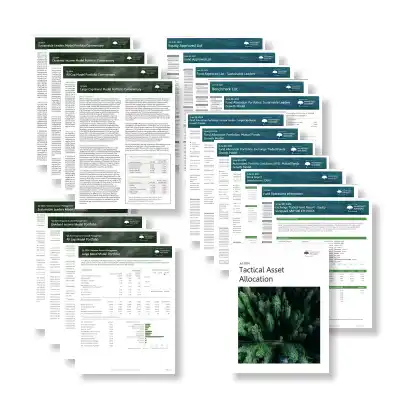At MainStreet Advisors, every Portfolio Manager is involved in the strategy development, analysis and decision-making processes that affect client portfolios. Our Investment Committees are designed to be a collaborative forum focused on aligning investment outcomes with client expectations. We value the expertise, insight and contributions of each team member.
Our Investment Committees meet regularly to discuss aspects of the investment management process. The committees are made up of members of the investment management team and include our Chief Investment Officer, as well as Portfolio Managers, Portfolio Analysts and Investment Analysts.
-
Fixed
Income - Funds
- Equity
-
Asset
Allocation
-
Fixed
Income - Funds
- Equity
-
Asset
Allocation
Committee
The Investment Committees oversee the research efforts of the following teams:
Asset Allocation
The Asset Allocation Team is responsible for developing strategic asset allocation targets and ranges for each of our five investment objectives.
Asset classes included in our investment objectives are those identified by the Asset Allocation Team. The Asset Allocation Team uses a variety of tools to analyze historical risk, return and correlation data as well as forward-looking estimates. This analysis informs the development of optimal target weights and ranges for our investment objectives.
Equity
The Equity Team is responsible for identifying equity candidates for our model portfolios utilizing both proprietary and external research to identify candidates. The goal of our equity selection process is to build high-quality, relatively concentrated, low turnover equity portfolios composed of holdings that represent our best ideas in a particular sector or industry. We seek to identify companies that provide a suitable balance of growth potential, financial statement quality and reasonable valuations. While our equity teams have the ability to express sector and industry preferences, our process is designed so that security selection is the primary driver of relative performance.
Sell decisions are often precipitated by deterioration in a holding’s financial statement trends including balance sheet quality, operating profitability and efficiency. A portfolio holding that exhibits absolute or relative valuation metrics deemed excessive by our equity strategy team can also result in a sell decision. Additionally, management changes, reputational risks and competitive threats deemed material by our equity teams can lead to the sale of a portfolio holding. Finally, holdings that experience protracted periods of under-performance can be sold as a risk control measure.
Fixed Income
The Fixed Income Team is responsible for providing guidance and recommendations with respect to the construction of fixed income allocations and strategies within client portfolios. This team serves as a forum for discussion and analysis pertaining to how the policy environment, macroeconomic backdrop, yield curve structure, issuance trends, broad credit trends and issuer-specific credit trends are likely to affect client portfolios. We focus on helping clients achieve a set of goals within their fixed income allocations depending upon risk tolerance, income needs and investment horizon.
Liquidity Asset Management (LAM) strategies employ a process that is focused on principal preservation, current yield opportunities and meeting the liquidity needs of our clients.
Intermediate and Core strategies are focused on building high-quality portfolios capable of generating enhanced yield and adding value through relative value-based security selection, sector allocation, yield curve positioning and duration risk management.
Funds
The Funds Team is responsible for conducting due diligence and ongoing evaluation of mutual funds and ETFs that are components of our multi-asset class strategies and candidates under consideration for inclusion.
We adhere to a disciplined process that combines qualitative, quantitative and operational elements. Quantitative analysis focuses on returns, risk, holdings-based return trends, style-based return trends and portfolio structure. The qualitative review includes an evaluation of a manager’s investment team, philosophy, security selection process, portfolio construction process, risk parameters and sell discipline. The operational review includes an evaluation of platform availability, liquidity constraints, fee structures, existing product offerings and parent company factors.
The Funds Team conducts a thorough review of all managers in our model portfolios at least annually. These reviews include an in-depth call or meeting with the manager and an update of all relevant quantitative, qualitative and operational factors.




